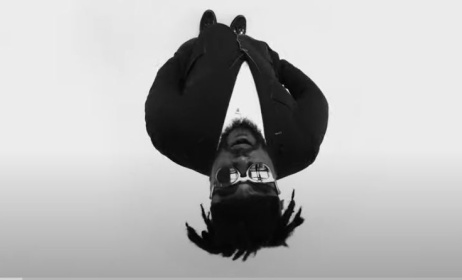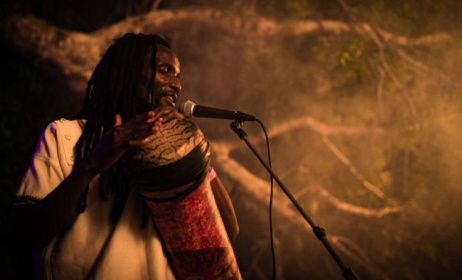DebeDebe seeks to promote live African drumming in Kenya
While there is no doubt that electronic sounds in music are here to stay, players of traditional instruments such as the drum ask the question: will the traditions of drums—from how they are built and who plays them to when they were played and why—continue into the future?
There are individuals and organizations in Kenya ensuring that traditional music instruments do not fade into oblivion. DebeDebe, a platform that is slowly becoming synonymous with drumming in Nairobi and throughout Kenya, is one of such organizations. Formed in 2013, the platform seeks to protect and promote the art of live African drumming whose teachers and traditions in the country have faded with modern times. On Friday 18 November, DebeDebe will stage a concert at the Goethe-Institut in Nairobi to further the art form.
“We are providing a platform for the percussionists to communicate their craft to the audience, whom we hope will in turn be inspired in one way or another, Zahir Nathoo, the DebeDebe Initiative Director tells Music In Africa.
Dubbed Mipigo (strikes), the show will kick off at 7:00pm local time and will feature 12 unique performances by 13 different artists on a wide range of percussive instruments. Mipigo, created by DebeDebe, is Kenya's first solo and duet percussion Performance platform. Through Mipigo, DebeDebe has created a platform in honour of drumming and percussionists.
“We hope to continue to attract local and international percussionists to come perform at Mipigo to give audiences a deeper respect and appreciation for this art form. Moreover, by gearing the platform towards solo and duets only, the audience gets to see ‘the artist in their element’ without the percussive skills being overshadowed by other instruments,” Zahir says.
Kasiva Mutua, one of the artists set to perform at the event, is among Kenya’s leading female drummers and percussionists. Kasiva’s performance is influenced by afro-beat, zouk and reggae among other influences. She will perform a solo dubbed ‘Pakashenzi’, and showcase her skills on the djembe and conga.
Also, showcasing the mastery of the West African djembe drum, Phillippa Crossland-Taylor an international aid worker who has settled in Kenya, will perform a duet named ‘Drumalogue’, alongside Daniel Mburu aka Mbutch. Other artists billed to perform at the event are Chalo-T, Michel Ongaro, Zahir, Tatyana, Sven Kacirek, Vee Kafi, Emilie Basez, Idd Aziz, Doro Buchie, Joji Porgy, Jonathan Fox and Blinky Bill.
DebeDebe was originally launched as an attempt to establish and build an appreciation for inherited values such as rhythm, land and community. During this formation period, the organization held weekly drum circles which offered like-minded individuals an opportunity to find one's natural rhythm by learning how to play the drums, reestablishing a connection and supporting each other in the process. Zahir says it is unfortunate that in Kenya, there seems to be a lack of political support and cultural protection for drummers and drumming.
“There is insufficient funding in general and sense of overall apathy as it relates to the protection of drumming traditions, which in the absence of teachers that are incentivized to "carry the torch," will fade with modern times.”
Having been side-tracked from this ambition for most of his life, Zahir's opportunity to deepen his commitment to music came when he accidentally ran into top percussionists, Charles Obuya, Daniel Mburu Muhuni alias Mbutch and Isaac Anyanga. Together they co-founded DebeDebe as a way to renew the respect, appreciation and support for all local urban musicians caught in the battle between tradition and modernity.
Zahir further says that the value of drumming is presently underestimated and local musicians are not paid or recognized nearly as much as they would be if they were in countries with a culture of, and political institutions that appreciate and support music.
“Soon there will be no one left to teach the rhythms of previous generations or even how to make the drums. Most drummers will fall into a modern form of drumming that would have lost its roots.”
Mentoring the next generation of drummers
While DebeDebe has no formalized mentorship programmes, they are working to provide a platform and avenue for aspiring drummers. “Ultimately, if we can acquire some funding, we could create a more robust system that attracts and develops drummers, providing holistic support that is rooted in an integrity and respect for the art form,” Zahir explains.
He says that DebeDebe hosts weekly drum circles (open to the public), as well as offers private lessons in drumming and percussion. In addition, the initiative facilitates group drumming and team building workshops and conducts professional music performances at popular venues throughout the city.
Electronic sounds can’t replace live instruments experience
Zahir notes that as the effect of technology in music increases, considering its ease of use in the modern era, there will certainly be infringement on the opportunities for incorporating live drums in music. He, however, says there is no substitute for both the sound and experience of live drumming and instruments.
“Musicians crave playing there instruments, and this is where the inspiration comes from in the first place. Electronic sounds cannot replace the experience of listening to live instruments being played in a musical performance, nor can it offer the satisfaction, healing and creativity that comes from a musician playing a live instrument.”
Zahir says this is where hope stays alive for live instruments enthusiasts like himself. In finality Zahir says the loss of traditional wisdom and knowledge is a calamity facing many aspects of human life - and drumming is no exception. “We are doing well when we can incorporate tradition into modernity, looking both forwards for progress and backwards for inspirations, respect, integrity and appreciation.”
The Mipigo concert is open to the public. Tickets cost KES. 500 ($4.91) For more information visit the event page(link is external).




































Comments
Log in or register to post comments